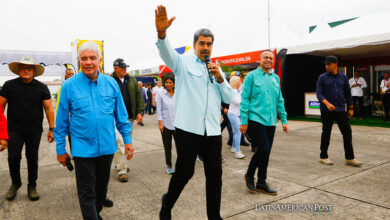The COVID-19 Pandemic: the Worst Enemy of a Government in Elections
The social and economic crisis that the COVID-19 pandemic has generated (or increased) has claimed a new electoral victim: the Colombia of Iván Duque .

Photo: Pexels
LatinAmerican Post | Santiago Gómez Hernández
Listen to this article
Leer en español: La pandemia de la COVID-19: la peor enemiga de un Gobierno en elecciones
Colombians came out to vote. Despite an abstention of close to 45%, the message of the citizens was clear: a punishment vote against the current Government of Iván Duque. Federico Gutiérrez, the candidate supported by the ruling party and by the Duke himself (without acknowledging it in public) was the biggest loser of the Colombian democratic day by placing 3 with 23.91% of the votes, away from Gustavo Petro (40.32%) and Rodolfo Hernandez (28.15%).
The Colombian elections demonstrated a phenomenon that has been occurring in several countries around the world: the punishment vote. It happened with Piñera in Chile, it happened in Peru with the interim governments promoted by Acción Popular, it happened in Honduras with Juan Orlando Hernández, it happened in Ecuador with Lenin Moreno, it happened in the United States with Donald Trump, and now it happened in Colombia.
It seems that the social crisis brought about by COVID-19 has claimed the heads of several governments. They were unable to provide the necessary responses to such a crisis.
If it is true that many other elements also influenced, there seems to be a pattern of nonconformity that happens in Latin America and in different other countries of the world. All of these are also related to the crisis generated by the COVID-19 health emergency.
A vaccination campaign that has had outstanding indicators in the region was not enough for Duque. The legacy of his mishandling of the 2021 National Strike led to an increase in disapproval, which today is close to 70%.
Last Sunday's vote was not only due to the news that the pandemic and the economic crisis have left. In Colombia, as in Ecuador, Chile, and even in the United States, a series of social protests and rejection of institutions were key elements to demonstrate the discontent of a government, but also of a political and economic system that has failed to satisfy the needs of citizens of the 21st century.
In the United States, police violence; in Chile, the increase in the subway rate; in Ecuador, an increase in fuel prices; and in Colombia, a failed tax reform was the spark needed to ignite years of dissatisfaction. This rejection is reflected today in the electoral results in these 4 countries. Recently, only Canada, France, and Hungary kept the ruling party and citizens voted to re-elect Justin Trudeau, Emmanuel Macron, and Viktor Orbán.
In almost all the elections in democratic countries, they have shown a general dissatisfaction with how governments have handled themselves.
A Favored Left
Whether by coincidence or by chance, the governments that have had to undergo the change of power during these times are, for the most part, right-wing. This has generated a new socialist wave in Latin America that has reached countries like Peru and Chile, where traditionally, the left had been much more moderate than the governments that Pedro Castillo and Gabriel Boric command today.
Even in the United States, where massive support for the reelection of the current president is traditional, nonconformity ended up bringing down a current president (Donald Trump). Something that hadn't happened since the days of Jimmy Carter. Neither Bill Clinton, George Bush Jr. nor Barak Obama, had lost their re-election.
Is Brazil next on the list?
In Brazil, there is a phenomenon that could strengthen this panorama and it would seem that it is going the same way as in the other countries. First, there is a polarized election between the current government of Jair Bolsonaro and the popular leftist leader, Luiz Inacio Lula da Silva. However, currently, the head of the Workers' Party leads the voting intention with about 48%.
If both factors are met: a favorable trend for the leftist parties and a punishment for the current governments, Brazil could once again have a socialist president after the removal of Dilma Rousseff in August 2016.
This would mark a continent completely located on the left side of the political spectrum. With a few exceptions like Ecuador, Uruguay, Paraguay, El Salvador, and a few others, most economies and heavyweights will be on the left side. Most of these with a progressive agenda focused on a discourse of equity and expanding the Welfare State in a post-pandemic scenario that has left millions of Latin Americans in extreme poverty.
A situation in which even today, every 30 hours there is another new billionaire in the world, but almost in parallel there are 1 million people in the world who are thrown into poverty. That is when leftist, populist, and anti-establishment speeches are much more interesting for the majority of voters.




